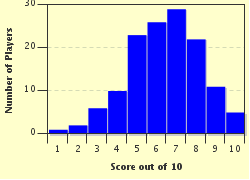Quiz Answer Key and Fun Facts
1. The poem "Mary, Mary, Quite Contrary" is a popular English nursery rhyme.
Of the following choices, which one is the MOST LIKELY candidate to be referred to as the subject of the poem?
2. This old English rhyme, circa the late 1700's, "Hot Cross Buns!", was usually associated with which of these holiday seasons?
3. Humpty-Dumpty, as nearly everyone knows, originated as a riddle about an egg. What I'd like to know, though, is this -
In the 17th century, what other TWO things might have been called a "humpty-dumpty"?
4. "Wee Willie Winkie", a poem that personifies bedtime sleep for young children, was written by a Scottish author named William Miller. The "Willie" referred to in the poem was none other than the author himself.
5. Whoooeee! How about this one?
Can you tell me which children's nursery rhyme, that was eventually set to music, was the "theme" song for "The Three Stooges", a slapstick vaudevillian style television program?
6. "Eeper Weeper, chimney sweeper,
Had a wife but couldn't keep her.
Had another, didn't love her,
Up the chimney he did shove her."
How bizarre!
Of which more modern version,which appeared later in 1825, was this "different" English nursery rhyme most probably an older "cousin"?
7. Ridiculous lawsuit? You decide...
In 2009, Southwest Airlines was sued over -
A nursery rhyme!
Which children's poem was claimed to be responsible for causing "intentional infliction of emotional distress and negligent infliction of emotional distress", by passengers aboard the flight?
(Think: counting)
8. In 1590, Englishman Sir Edmund Spenser penned these words:
"It was upon a Sommers shynie day, When Titan faire his beames did display, In a fresh fountaine, farre from all mens vew, She bath'd her brest, the boyling heat t'allay; She bath'd with roses red, and violets blew, And all the sweetest flowers, that in the forrest grew."
By what more modern title is this poem perhaps better known?
9. A U.S. poet of children's nursery rhymes was once arrested for treason, during the Abraham Lincoln administration. Poet Septimus Winner had written a poem FAVORING a Civil War General, George B. McClellan, and was subsequently charged with treason.
Can you recall two of the more popular nursery rhymes he had written, prior to his arrest?
10. Maybe you've heard the poem "Little Bo-Peep". You know, the girl who lost her sheep?
Where did the terminology "to play bo peep" or "to play bo pepe" originate?
Source: Author
logcrawler
This quiz was reviewed by FunTrivia editor
looney_tunes before going online.
Any errors found in FunTrivia content are routinely corrected through our feedback system.

